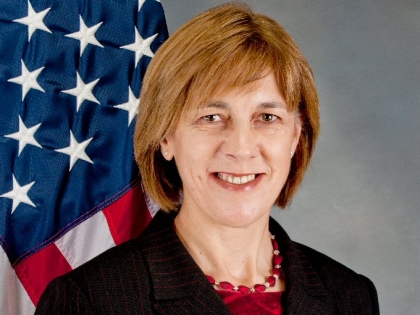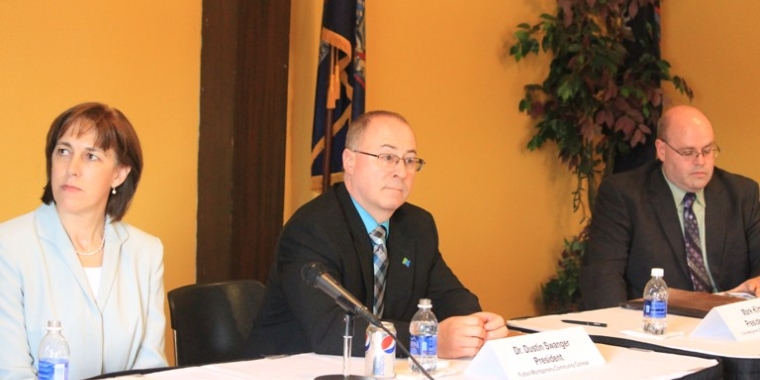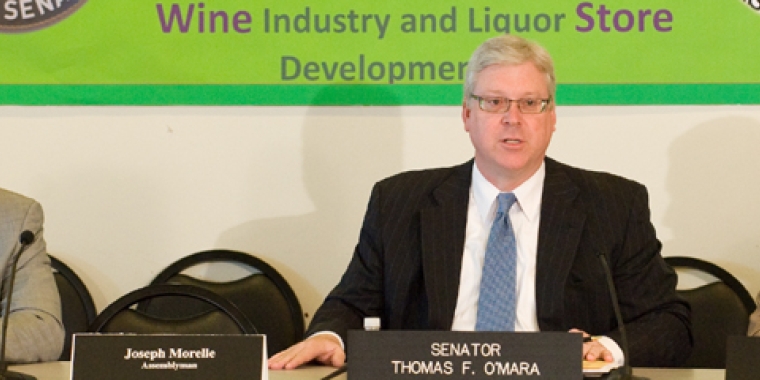
The Recorder: Tech forum focuses on the educational need

Wednesday, April 23, 2014
By NICOLE ANTONUCCI
JOHNSTOWN -- To take advantage of potential economic development opportunities and create jobs In the high-tech industry, local officials are turning their focus to education.
At a Mohawk Valley Technology Forum Tuesday, local stakeholders and experts discussed the opportunities for economic growth in the region and how preparing students for those opportunities Is the key to success.
"We have a rare opportunity to establish the Mohawk Valley as a high-tech development and a center for technological innovation and job creation," Sen. Cecilia Tkaczyk, D-Duanesburg, said. "I see education as being the key to that."
The forum included a panel discussion among Fulton-Montgomery Community College President Dustin Swanger, Hamilton-Fulton-Montgomery BOCES District Superintendent Patrick Michel, and Fulton-Montgomery Regional Chamber of Commerce President Mark Kilmer.
The panel spoke about the technological advancements taking place at the College of Nanoscale and Engineering in Albany and SUNY Institute of Technology in Utica.
"We are right in the middle of two major multi-million dollar investments in our economy, technology and in our future," Swanger said. "This community has to plan for where we are going as a community."
Kilmer added the Mohawk Valley is not only uniquely positioned for growth in the technology sector but has the availability many companies are seeking.
There are seven industrial business parks in Montgomery and Fulton counties that have buildings available as well as sites that can be built upon, he said.
With access to the Thruway and close proximity to major port cities like Boston, New York City and Philadelphia, the area is well positioned for transport.
However, Swanger explained that to take advantage of the future jobs, its not enough that students have a high school diploma. Many of these jobs require at least an associate's degree. Thus, educators must take a new approach to learning.
By providing more opportunities, such as getting students interested in Science Technology Engineering and Math (STEM), they can be better prepared, he said.
Michele agreed, stating there also needs to be more collaboration between schools and the business community. For example, having BOCES and F-MCC on the same campus proved beneficial when BOCES obtained a $2.7 million grant through the state's Pathways in Technology Early College High School (P-TECH) program. Students in 13 school districts will be given training in areas such has health care, manufacturing, engineering and technology and not only will they obtain a high school diploma but an associate's degree at no cost through F-MCC.
Michele said that so far only seven districts have signed up for the program and already there are 77 applications for the 50 spots.
"What that tells me is that students and parents also recognize that we must do post secondary education differently in the state," he said. "The pathways are set up so students have choices between four different areas that will lead to hopefully a high paying job in this region."
Michele said that education is also key to attracting families to the area. With Montgomery and Fulton counties, economically hard-hit and the poverty situation a harsh reality, attracting middle-class families will be an economic advantage to businesses, the schools, and the communities to become successful.
"If we do not improve our public schools to the point where middle class and upper middle class say, 'this is the place where I want to be,' there is going to be a black hole in the middle of this development. No one is going to come here," Michele said.
When Tkaczyk asked what elected officials could do to support local efforts to spur growth, the answer was the same: Become business friendly.
According to Kilmer, regulations and high taxes are the top deterrents for businesses but by streamlining the process, such as expediting the permit process, more businesses would be attracted to the area.
The panelists also spoke about quality of life and housing issues in the area, commenting on the lack of social venues for the younger folks and the lack of condominiums and other housing varieties that could attract a different demographic.
The panel also answered questions from the audience, which included staff, students, members of the community and representatives from Montgomery County.
Liza Uhlinger, a student, asked what residents could do to help move the region forward.
Swanger replied that the public should be involved with politics by going to public meetings and providing feedback to the politicians.
"We need to be a voice of change as a community," Swanger said.
Other questions involved addressing the abandoned properties in the area, whether through new business or by demolishing.
"I don't think it helps the area. Is there any way to demolish those buildings so there is green space?" local business owner Vincenza Geloso-Ecker asked.
Tkaczyk remarked that there are efforts on the state level to provide funding to local municipalities including the recent allocation of $9 million for properties who sustained substantial flood damage.
Due to lack of time, the forum ended but Tkaczyk thanked the panelists for their discussion.
"You need to keep challenging all of us in what we need to have here and let's have that shared vision and optimism," she said. " I cant say how important the educational system is to the future of economic development is here. We have to continue to improve on that product."

